- Home
- Upton Sinclair
The Jungle Page 26
The Jungle Read online
Page 26
He was used to the sight of human wrecks, this saloon-keeper; he “fired” dozens of them every night, just as haggard and cold and forlorn as this one. But they were all men who had given up and been counted out, while Jurgis was still in the fight, and had reminders of decency about him. As he got up meekly, the other reflected that he had always been a steady man, and might soon be a good customer again. “You’ve been up against it, I see,” he said. “Come this way.”
In the rear of the saloon were the cellar-stairs. There was a door above and another below, both safely padlocked, making the stairs an admirable place to stow away a customer who might still chance to have money, or a political light whom it was not advisable to kick out of doors.
So Jurgis spent the night. The whiskey had only half warmed him, and he could not sleep, exhausted as he was; he would nod forward, and then start up, shivering with the cold, and begin to remember again. Hour after hour passed, until he could only persuade himself that it was not morning by the sounds of music and laughter and singing that were to be heard from the room. When at last these ceased, he expected that he would be turned out into the street; as this did not happen, he fell to wondering whether the man had forgotten him.
In the end, when the silence and suspense were no longer to be borne, he got up and hammered on the door; and the proprietor came, yawning and rubbing his eyes. He was keeping open all night, and dozing between customers.
“I want to go home,” Jurgis said. “I’m worried about my wife—I can’t wait any longer.”
“Why the hell didn’t you say so before?” said the man. “I thought you didn’t have any home to go to.”
Jurgis went outside. It was four o‘clock in the morning, and as black as night. There were three or four inches of fresh snow on the ground, and the flakes were falling thick and fast. He turned toward Aniele’s and started at a run.
There was a light burning in the kitchen window and the blinds were drawn. The door was unlocked and Jurgis rushed in.
Aniele, Marija, and the rest of the women were huddled about the stove, exactly as before; with them were several new-comers, Jurgis noticed—also he noticed that the house was silent.
“Well?” he said.
No one answered him; they sat staring at him with their pale faces. He cried again: “Well?”
And then, by the light of the smoky lamp, he saw Marija, who sat nearest him, shaking her head slowly. “Not yet,” she said.
And Jurgis gave a cry of dismay. “Not yet?”
Again Marija’s head shook. The poor fellow stood dumfounded. “I don’t hear her,” he gasped.
“She’s been quiet a long time,” replied the other.
There was another pause—broken suddenly by a voice from the attic: “Hello, there!”
Several of the women ran into the next room, while Marija sprang toward Jurgis. “Wait here!” she cried, and the two stood, pale and trembling, listening. In a few moments it became clear that Madame Haupt was engaged in descending the ladder, scolding and exhorting again, while the ladder creaked in protest. In a moment or two she reached the ground, angry and breathless, and they heard her coming into the room. Jurgis gave one glance at her, and then turned white and reeled. She had her jacket off, like one of the workers on the killing-beds. Her hands and arms were smeared with blood, and blood was splashed upon her clothing and her face.
She stood breathing hard, and gazing about her; no one made a sound.
“I haf done my best,” she began suddenly. “I can do netting more—dere is no use to try.”
Again there was silence.
“It ain’t my fault,” she said. “You had ought to haf had a doctor, und not vaited so long—it vas too late already ven I come.” Once more there was deathlike stillness. Marija was clutching Jurgis with all the power of her one well arm.
Then suddenly Madame Haupt turned to Aniele. “You haf not got someting to drink, hey?” she queried. “Some brandy?”
Aniele shook her head.
“Herr Gott!” exclaimed Madame Haupt. “Such people! Perhaps you vill give me someting to eat den—I haf had notting since yesterday morning, und I haf vorked myself near to death here. If I could haf known it vas like dis, I vould never haf come for such money as you gif me.”
At this moment she chanced to look round, and saw Jurgis. She shook her finger at him. “You understand me,” she said, “you pays me dot money yust de same! It is not my fault dat you send for me so late I can’t help you vife. It is not my fault if der baby comes mit one arm first, so dot I can’t save it. I haf tried all night, und in dot place vere it is not fit for dogs to be born, und mit notting to eat only vot I brings in mine own pockets.”
Here Madame Haupt paused for a moment to get her breath; and Marija, seeing the beads of sweat on Jurgis’s forehead, and feeling the quivering of his frame, broke out in a low voice: “How is Ona?”
“How is she?” echoed Madame Haupt. “How do you tink she can be ven you leave her to kill herself so? I told dem dot ven dey send for de priest. She is young, und she might haf got over it, und been vell und strong, if she been treated right. She fight hard, dot girl—she is not yet quite dead.”
And Jurgis gave a frantic scream. “Dead!”
“She vill die, of course,” said the other, angrily. “Der baby is dead now.”
The garret was lighted by a candle stuck upon a board; it had almost burned itself out, and was sputtering and smoking as Jurgis rushed up the ladder. He could make out dimly in one corner a pallet of rags and old blankets, spread upon the floor; at the foot of it was a crucifix, and near it a priest muttering a prayer. In a far corner crouched Elzbieta, moaning and wailing. Upon the pallet lay Ona.
She was covered with a blanket, but he could see her shoulders and one arm lying bare; she was so shrunken he would scarcely have known her—she was all but a skeleton, and as white as a piece of chalk. Her eyelids were closed, and she lay still as death. He staggered toward her and fell upon his knees with a cry of anguish: “Ona! Ona!”
She did not stir. He caught her hand in his, and began to clasp it frantically, calling: “Look at me! Answer me! It is Jurgis come back—don’t you hear me?”
There was the faintest quivering of the eyelids, and he called again in frenzy: “Ona! Ona!”
Then suddenly her eyes opened—one instant. One instant she looked at him—there was a flash of recognition between them, he saw her afar off, as through a dim vista, standing forlorn. He stretched out his arms to her, he called her in wild despair; a fearful yearning surged up in him, hunger for her that was agony, desire that was a new being born within him, tearing his heartstrings, torturing him. But it was all in vain—she faded from him, she slipped back and was gone. And a wail of anguish burst from him, great sobs shook all his frame, and hot tears ran down his cheeks and fell upon her. He clutched her hands, he shook her, he caught her in his arms and pressed her to him; but she lay cold and still—she was gone—she was gone!
The word rang through him like the sound of a bell, echoing in the far depths of him, making forgotten chords to vibrate, old shadowy fears to stir—fears of the dark, fears of the void, fears of annihilation. She was dead! She was dead! He would never see her again, never hear her again! An icy horror of loneliness seized him; he saw himself standing apart and watching all the world fade away from him—a world of shadows, of fickle dreams. He was like a little child, in his fright and grief; he called and called, and got no answer, and his cries of despair echoed through the house, making the women down-stairs draw nearer to each other in fear. He was inconsolable, beside himself—the priest came and laid his hand upon his shoulder and whispered to him, but he heard not a sound. He was gone away himself, stumbling through the shadows, and groping after the soul that had fled.
So he lay. The gray dawn came up and crept into the attic. The priest left, the women left, and he was alone with the still, white figure—quieter now, but moaning and shuddering, wrestling with the grisly fiend. Now
and then he would raise himself and stare at the white mask before him, then hide his eyes, because he could not bear it. Dead! dead! And she was only a girl, she was barely eighteen! Her life had hardly begun—and here she lay murdered—mangled, tortured to death!
It was morning when he rose up and came down into the kitchen—haggard and ashen gray, reeling and dazed. More of the neighbors had come in, and they stared at him in silence as he sank down upon a chair by the table and buried his face in his arms.
A few minutes later the front door opened; a blast of cold and snow rushed in, and behind it little Kotrina, breathless from running, and blue with the cold. “I’m home again!” she exclaimed. “I could hardly—”
And then, seeing Jurgis, she stopped with an exclamation. Looking from one to another she saw that something had happened, and she asked, in a lower voice: “What’s the matter?”
Before any one could reply, Jurgis started up; he went toward her, walking unsteadily. “Where have you been?” he demanded.
“Selling papers with the boys,” she said. “The snow—”
“Have you any money?” he demanded.
“Yes.”
“How much?”
“Nearly three dollars, Jurgis.”
“Give it to me.”
Kotrina, frightened by his manner, glanced at the others. “Give it to me!” he commanded again, and she put her hand into her pocket and pulled out a lump of coins tied in a bit of rag. Jurgis took it without a word, and went out of the door and down the street.
Three doors away was a saloon. “Whiskey,” he said, as he entered, and as the man pushed him some, he tore at the rag with his teeth and pulled out half a dollar. “How much is the bottle?” he said. “I want to get drunk.”
TWENTY
BUT A big man cannot stay drunk very long on three dollars. That was Sunday morning, and Monday night Jurgis came home, sober and sick, realizing that he had spent every cent the family owned, and had not bought a single instant’s forgetfulness with it.
Ona was not yet buried; but the police had been notified, and on the morrow they would put the body in a pine coffin and take it to the potter’s field. Elzbieta was out begging now, a few pennies from each of the neighbors, to get enough to pay for a mass for her; and the children were upstairs starving to death, while he, good-for-nothing rascal, had been spending their money on drink. So spoke Aniele, scornfully, and when he started toward the fire she added the information that her kitchen was no longer for him to fill with his phosphate stinks. She had crowded all her boarders into one room on Ona’s account, but now he could go up in the garret where he belonged—and not there much longer, either, if he did not pay her some rent.
Jurgis went without a word, and, stepping over half a dozen sleeping boarders in the next room, ascended the ladder. It was dark up above; they could not afford any light; also it was nearly as cold as outdoors. In a corner, as far away from the corpse as possible, sat Marija, holding little Antanas in her one good arm and trying to soothe him to sleep. In another corner crouched poor little Juozapas, wailing because he had had nothing to eat all day. Marija said not a word to Jurgis; he crept in like a whipped cur, and went and sat down by the body.
Perhaps he ought to have meditated upon the hunger of the children, and upon his own baseness; but he thought only of Ona, he gave himself up again to the luxury of grief. He shed no tears, being ashamed to make a sound; he sat motionless and shuddering with his anguish. He had never dreamed how much he loved Ona, until now that she was gone; until now that he sat here, knowing that on the morrow they would take her away, and that he would never lay eyes upon her again—never all the days of his life. His old love, which had been starved to death, beaten to death, awoke in him again; the flood-gates of memory were lifted—he saw all their life together, saw her as he had seen her in Lithuania, the first day at the fair, beautiful as the flowers, singing like a bird. He saw her as he had married her, with all her tenderness, with her heart of wonder; the very words she had spoken seemed to ring now in his ears, the tears she had shed to be wet upon his cheek. The long, cruel battle with misery and hunger had hardened and embittered him, but it had not changed her—she had been the same hungry soul to the end, stretching out her arms to him, pleading with him, begging him for love and tenderness. And she had suffered—so cruelly she had suffered, such agonies, such infamies—ah, God, the memory of them was not to be borne. What a monster of wickedness, of heartlessness, he had been! Every angry word that he had ever spoken came back to him and cut him like a knife; every selfish act that he had done—with what torments he paid for them now! And such devotion and awe as welled up in his soul—now that it could never be spoken, now that it was too late, too late! His bosom was choking with it, bursting with it; he crouched here in the darkness beside her, stretching out his arms to her—and she was gone forever, she was dead! He could have screamed aloud with the horror and despair of it; a sweat of agony beaded his forehead, yet he dared not make a sound—he scarcely dared to breathe, because of his shame and loathing of himself.
Late at night came Elzbieta, having gotten the money for a mass, and paid for it in advance, lest she should be tempted too sorely at home. She brought also a bit of stale rye-bread that some one had given her, and with that they quieted the children and got them to sleep. Then she came over to Jurgis and sat down beside him.
She said not a word of reproach—she and Marija had chosen that course before; she would only plead with him, here by the corpse of his dead wife. Already Elzbieta had choked down her tears, grief being crowded out of her soul by fear. She had to bury one of her children—but then she had done it three times before, and each time risen up and gone back to take up the battle for the rest. Elzbieta was one of the primitive creatures: like the angleworm, which goes on living though cut in half; like a hen, which, deprived of her chickens one by one, will mother the last that is left her. She did this because it was her nature—she asked no questions about the justice of it, nor the worthwhileness of life in which destruction and death ran riot.
And this old common-sense view she labored to impress upon Jurgis, pleading with him with tears in her eyes. Ona was dead, but the others were left and they must be saved. She did not ask for her own children. She and Marija could care for them somehow, but there was Antanas, his own son. Ona had given Antanas to him—the little fellow was the only remembrance of her that he had; he must treasure it and protect it, he must show himself a man. He knew what Ona would have had him do, what she would ask of him at this moment, if she could speak to him. It was a terrible thing that she should have died as she had; but the life had been too hard for her, and she had to go. It was terrible that they were not able to bury her, that he could not even have a day to mourn her—but so it was. Their fate was pressing; they had not a cent, and the children would perish—some money must be had. Could he not be a man for Ona’s sake, and pull himself together? In a little while they would be out of danger—now that they had given up the house they could live more cheaply, and with all the children working they could get along, if only he would not go to pieces. So Elzbieta went on, with feverish intensity. It was a struggle for life with her; she was not afraid that Jurgis would go on drinking, for he had no money for that, but she was wild with dread at the thought that he might desert them, might take to the road, as Jonas had done.
But with Ona’s dead body beneath his eyes, Jurgis could not well think of treason to his child. Yes, he said, he would try, for the sake of Antanas. He would give the little fellow his chance—would get to work at once, yes, to-morrow, without even waiting for Ona to be buried. They might trust him, he would keep his word, come what might.
And so he was out before daylight the next morning, headache, heartache, and all. He went straight to Graham’s fertilizer-mill, to see if he could get back his job. But the boss shook his head when he saw him—no, his place had been filled long ago, and there was no room for him.
“Do you think there wil
l be?” Jurgis asked. “I may have to wait.”
“No,” said the other, “it will not be worth your while to wait—there will be nothing for you here.”
Jurgis stood gazing at him in perplexity. “What is the matter?” he asked. “Didn’t I do my work?”
The other met his look with one of cold indifference, and answered, “There will be nothing for you here, I said.”
Jurgis had his suspicions as to the dreadful meaning of that incident, and he went away with a sinking at the heart. He went and took his stand with the mob of hungry wretches who were standing about in the snow before the time-station. Here he stayed, breakfastless, for two hours, until the throng was driven away by the clubs of the police. There was no work for him that day.
Jurgis had made a good many acquaintances in his long services at the yards—there were saloon-keepers who would trust him for a drink and a sandwich, and members of his old union who would lend him a dime at a pinch. It was not a question of life and death for him, therefore; he might hunt all day, and come again on the morrow, and try hanging on thus for weeks, like hundreds and thousands of others. Meantime, Teta Elzbieta would go and beg, over in the Hyde Park district, and the children would bring home enough to pacify Aniele, and keep them all alive.
It was at the end of a week of this sort of waiting, roaming about in the bitter winds or loafing in saloons, that Jurgis stumbled on a chance in one of the cellars of Jones’s big packing plant. He saw a foreman passing the open doorway, and hailed him for a job.
“Push a truck?” inquired the man, and Jurgis answered, “Yes, sir!” before the words were well out of his mouth.
“What’s your name?” demanded the other.
“Jurgis Rudkus.”
“Worked in the yards before?”
“Yes.”
“Whereabouts?”
“Two places,—Brown’s killing-beds and Durham’s fertilizer-mill.”

 Prince Hagen
Prince Hagen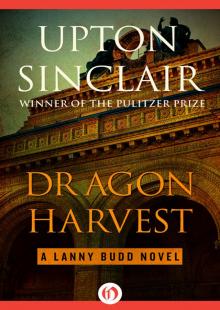 Dragon Harvest
Dragon Harvest The Jungle
The Jungle Sylvia's Marriage
Sylvia's Marriage Oil! A Novel by Upton Sinclair
Oil! A Novel by Upton Sinclair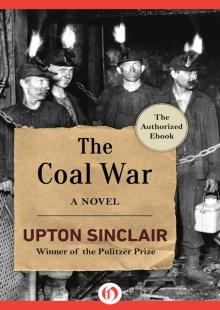 The Coal War: A Novel
The Coal War: A Novel Presidential Agent
Presidential Agent World's End
World's End The Second-Story Man
The Second-Story Man O Shepherd, Speak!
O Shepherd, Speak!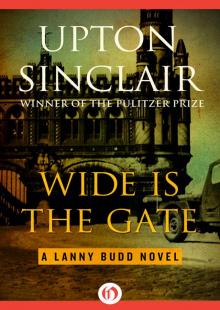 Wide Is the Gate
Wide Is the Gate The Return of Lanny Budd
The Return of Lanny Budd One Clear Call I
One Clear Call I 100%: the Story of a Patriot
100%: the Story of a Patriot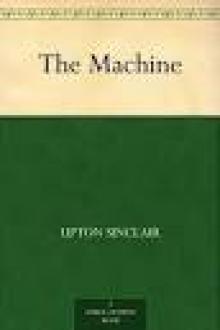 The Machine
The Machine Presidential Mission
Presidential Mission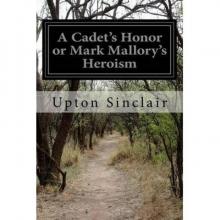 A Cadet's Honor: Mark Mallory's Heroism
A Cadet's Honor: Mark Mallory's Heroism Between Two Worlds
Between Two Worlds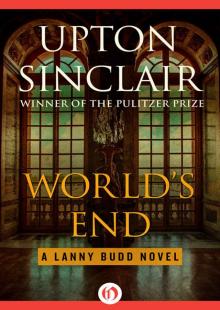 World's End (The Lanny Budd Novels)
World's End (The Lanny Budd Novels) Between Two Worlds (The Lanny Budd Novels)
Between Two Worlds (The Lanny Budd Novels)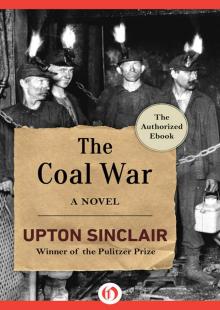 The Coal War
The Coal War Presidential Agent (The Lanny Budd Novels)
Presidential Agent (The Lanny Budd Novels) Oil (filmed as There Will Be Blood)
Oil (filmed as There Will Be Blood)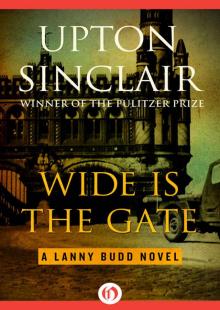 Wide Is the Gate (The Lanny Budd Novels)
Wide Is the Gate (The Lanny Budd Novels)